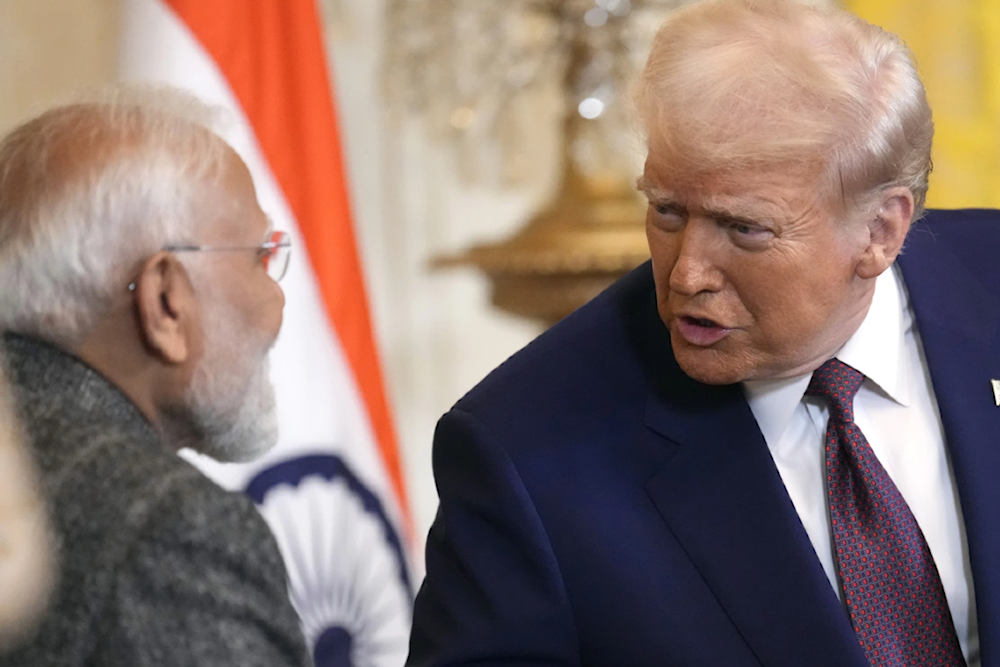Trump imposes 25% tariff on India; New Delhi vows to defend interests
The US president's 25% tariff on Indian goods is attributed to the country's ties to Russian oil.
-

US President Donald Trump speaks with India's Prime Minister Narendra Modi during a news conference in the East Room of the White House, on February 13, 2025, in Washington (AP)
US President Donald Trump signed an executive order Wednesday imposing an additional 25% tariff on imports from India, citing the country’s direct or indirect importation of Russian oil. The new tariffs come on top of duties already announced earlier this year.
So, in addition to a 25% tariff that is set to go into effect Thursday, Trump announced an additional 25% tariff on India that will go into effect later this month as punishment for importing Russian oil and gas.
Those combined penalties would bring the total tariff on goods imported from the world’s fifth-largest economy to a whopping 50% – among the highest the US charges.
India responds
India has responded firmly to the United States’ decision, pledging to take all necessary steps to safeguard its national interests.
In a statement, the Ministry of External Affairs expressed regret over the move, emphasizing that similar actions by other nations have not triggered such punitive measures from Washington.
New Delhi called the tariffs "unjustified and unreasonable" but reaffirmed its commitment to defending its economic interests through continued dialogue and diplomatic engagement.
Officials recently revealed that senior aides to Indian Prime Minister Narendra Modi are set to visit Russia in the coming days, just after US President Donald Trump escalated threats to impose tariffs over New Delhi’s close ties with Moscow.
Move risks relations
The move risks further straining US-India relations, which have already hit a low point after recent trade talks failed to yield an agreement. It also comes just days after reports that Indian Prime Minister Narendra Modi plans to visit China later this month for the first time in over seven years.
The decision was first hinted at by Trump on Monday and follows recent meetings in Moscow by Trump’s top envoy, Steve Witkoff, aimed at pressuring Russia into ending its war in Ukraine.
Trump has warned of escalating tariffs on Russia and secondary sanctions on its trading partners unless President Vladimir Putin takes concrete steps toward ending the war.
Despite recent pressures, India's broader trade strategy remains focused on balancing domestic industrial development with international engagement.
Trump eyes 100% tariffs on nations purchasing Russian oil
Russian President Vladimir Putin is unlikely to yield to a sanctions ultimatum set by US President Donald Trump, which expires this Friday, and he continues to pursue the objective of fully seizing four regions of Ukraine, sources close to the Kremlin told Reuters.
Trump has warned that he will impose new sanctions on Russia and enforce 100% tariffs on nations purchasing Russian oil, primarily China and India, the largest buyers, unless Putin agrees to a ceasefire in the ongoing war in Ukraine.
Putin's resolve to continue the war stems from his conviction that Russia is gaining the upper hand, as well as his doubt that additional US sanctions will significantly affect Russia, given the multiple rounds of economic penalties imposed over the past three and a half years of conflict, Reuters cited three sources familiar with discussions in the Kremlin as saying.
The Russian leader is reluctant to provoke Trump, and he acknowledges that he may be rejecting an opportunity to ease tensions with Washington and the West, but his military objectives in the war remain his top priority, according to two of the sources.
According to one of the sources, Putin aims to achieve complete control over Ukraine's Donetsk, Lugansk, Zaporizhzhia, and Kherson regions, which Russia has already declared as annexed territory, before entering any negotiations regarding a potential peace settlement.

 4 Min Read
4 Min Read








